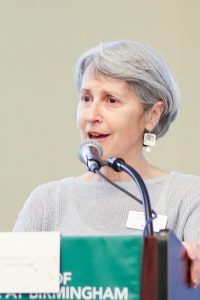
TUSCALOOSA, Ala. – Robert May was born in 1926, the youngest of three boys. For several generations, his family owned a dry goods store. They worshipped at a small synagogue that served 12-15 Jewish families in his community, and his father served as unofficial cantor.
Then in 1933, Adolf Hitler came to power and anti-Semitism exploded. “Der Stürmer,” the anti-Semitic Nazi tabloid, was prominently displayed about town. The neighborhood grocer would no longer sell to the family. Classmates joined the Hitler Youth, and fear became part of daily life. May’s life changed forever that year, but he survived the Holocaust.
On April 9, The University of Alabama’s Division of Diversity, Equity and Inclusion in collaboration with Bloom Hillel at UA, the Chabad Jewish Student Group, the Faculty Senate Committee on Diversity, Equity and Inclusion, the Jewish Law Students Association and Temple Emanu-El, will host “Holocaust Remembrance” at the Ferguson Student Center ballroom at 7 p.m. A reception will follow.
The event, which is the second part of the two-part remembrance, will feature May’s daughter, Ann Mollengarden, who is vice president of education for the board of directors at the Birmingham Holocaust Education Center, as the guest speaker.
“It’s so important for our students to have information and context about historical events. Having knowledge about the Holocaust – that major atrocity against humanity – is important context to have, particularly in light of what happened recently in Pittsburgh at the Tree of Life synagogue and the growing anti-Semitism in the country,” said Dr. G. Christine Taylor, vice president and associate provost for Diversity, Equity and Inclusion at UA.
The first part of the two-part remembrance is already in place and open to the campus community through the Birmingham Holocaust Education Center’s traveling exhibit featuring the lives of Holocaust survivors who relocated to Alabama. Those panels are currently being displayed at Gorgas Library and a number of different academic buildings throughout campus.
Josh Kravec, a law student and president of the Jewish Law Student Association, said as time passes and the tragedy of the Holocaust gets further removed from memory, it becomes even more important to have remembrance events regarding it.
“As that time lengthens, it becomes more important that we talk about what happened, not just for the Jewish people, but for all people, so we don’t repeat the mistakes of the past,” he said. “It’s a reminder to the world that this type of thing can still happen and we need to treat everyone with respect so that it doesn’t.
“As a Jewish student, it’s my opinion that anti-Semitism and hate for any group of people comes from not having enough exposure to them, and not understanding what they’ve been through. It’s important to know who we are, what we do and that this event happened to us. It’s important because it humanizes us.”
Contact
Jamon Smith, media relations, jamon.smith@ua.edu, 205/348-4956
Source
Dr. Christine Taylor, christine.taylor@ua.edu, 205/348-2053
